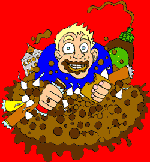Can’t stop devouring junk food?
 How drug addictions, unhealthy food cravings are similar
How drug addictions, unhealthy food cravings are similar
By: Victoria Stern 04/29/10
Examiner Columnist
For some people, eating just one bite of a chocolate cupcake or one chip from a bag is nearly impossible. However, the more treats you consume each day, the more you’ll need that sugar fix, according to new research.
Scientists think that intense junk food cravings and drug addiction are more similar than one might think.
Researchers at the Scripps Research Institute in Florida have shown for the first time that compulsive overeating triggers the same changes in behavior and brain function as a drug addiction.
“These findings confirm what we and many others have suspected — that junk food causes addiction-like responses in the brain and can lead to obesity,” says lead study author Paul Kenny, a professor of molecular therapeutics at the Scripps Research Institute.
To determine the underlying cause of food addiction, Kenny and his colleague Paul Johnson examined the eating behaviors of rats. The researchers split the rats into three groups: One group received a normal nutritious diet of greens; the second group got a diet of fatty, high-calorie foods — the human equivalent of treats such as bacon and cheesecake — and the third group received mostly healthy chow, except for unlimited access to junk food for one hour each day.
The team found the animals exposed to junk food all day became compulsive overeaters, consuming two times more calories than the rats that ate healthy food, and began bulking up in just a few weeks. The kicker is that the obese rats continued to consume junk food in excess even when doing so would result in electrical shocks to the rats’ feet.
“This kind of compulsive behavior is just what we see in drug addicts,” Kenny says.
The rats with limited access to junk food became binge eaters, consuming all their calories in the one-hour junk food window.
However, these rats did not become obese, indicating that obesity may be associated more strongly with compulsive, not binge, eating, Kenny notes.
Next, the researchers wanted to see what neurological changes occurred in the brains of obese rats.
They focused on a brain receptor, called the dopamine that has been shown to play a key role in drug addiction. The receptor works by binding dopamine, a chemical released in the brain during a pleasurable experience, like sex, or consumption of food or drugs.
The researchers found that eating junk food caused a flood of dopamine in the brain. When a rat’s pleasure center became overstimulated with dopamine, its brain started to adapt by decreasing the activity of receptors, Kenny says. As these pleasure centers became less responsive, the rat quickly developed compulsive habits to avoid withdrawal, consuming larger quantities of food until it became obese.
The researchers also engineered some rats to have fewer receptors and fed them unlimited junk food. Bingo! The animals became compulsive overeaters almost overnight.
“This could mean that individuals born with fewer receptors are much more likely to become addicts of food or drugs,” Kenny says.
Although the team has not figured out a way to curb food addiction, Kenny suggests that understanding the addiction pathway in more detail will help generate treatment options for obesity.
“Hopefully, one day we’ll be able to effectively tweak these addiction pathways,” Kenny says.